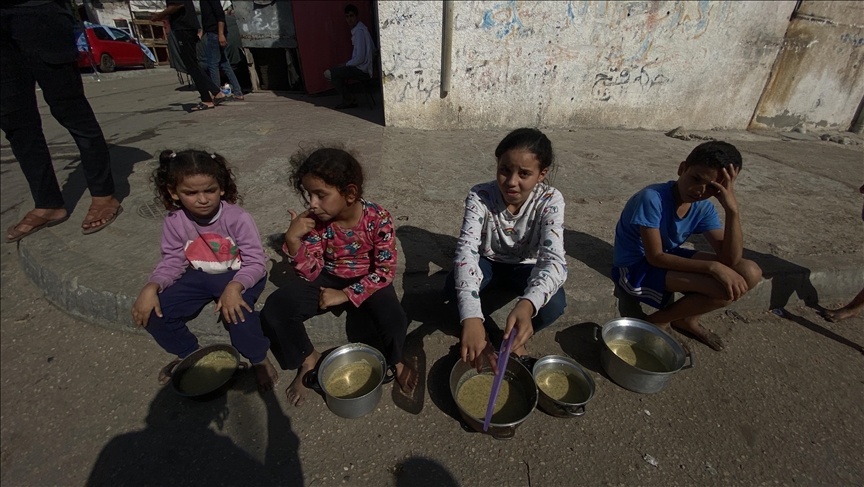“With winter fast approaching and the unsafe and overcrowded shelters that lack of clean water, people are facing the immediate possibility of starvation,” Abeer Etefa, WFP spokesperson for the Middle East and North Africa, said Thursday.
Etefa spoke at a virtual UN news conference alongside Juliet Touma, communications director at the UN Relief and Works Agency (UNRWA), about the situation in the Palestinian enclave.
Etefa briefed reporters from Cairo and said Gazans are becoming more desperate every day in their search for bread and essential foods.
“Bread is a way of luxury,” she added.
“We already started to see cases of dehydration and malnutrition, which is increasing rapidly and by the day,” Etefe continued, noting, “With only 10% of necessity food supplies and drink in Gaza since the beginning of this conflict, we’re now facing a massive food gap.”
She stressed that 2.2 million residents, which is nearly the entire population of the Gaza Strip, are now in need of food assistance.
“Food production has come to an almost complete halt,” said Etefa.
She added that for those fortunate enough to find food, “this meal will include maybe a canned food.”
Etefa stressed to meet the growing needs inside Gaza, the number of trucks that are crossing with food assistance needs to be increased.
“There is no way to meet the current hunger needs with the current situation,” she said, adding, “We have to have a different space that allows us to have safe access and to have the flowing of goods inside Gaza.”
The collapse of the food supply chain is “catastrophic” and said the situation before the conflict was difficult but now it is “disastrous,” she stated.
WFP Executive Director Cindy McCain also said in a statement Thursday people in Gaza are facing an “immediate possibility of starvation” as fuel shortages cripple food production and distribution in the enclave.
“Supplies of food and water are practically non-existent in Gaza and only a fraction of what is needed is arriving through the borders,” McCain stated.
According to the WFP, only 10% of necessary food supplies has entered Gaza since the start of the war with fuel shortages severely impacting bread production as well as the distribution of essential humanitarian aid with aid trucks unable to reach their destination.
The head of the UN Relief and Works Agency for Palestine Refugees in the Near East also reiterated these concerns, stressing thousands of people taking shelter at UNRWA facilities in Gaza are “dehydrated, exhausted, hungry and shell-shocked.”
“The children were pleading for a sip of water and a loaf of bread,” Philippe Lazzarini said of his recent visit to Gaza.
The WFP announced it has provided emergency food aid to more than 700,000 displaced Gazans and is planning to reach more than one million people in the next few weeks, but stressed these needs cannot be met with only the Rafah border crossing with Egypt open.
“The only hope is opening another, safe passage for humanitarian access to bring life-saving food into Gaza,” added McCain.
Lazzarini reiterated that if the UNRWA isn’t able to get fuel soon, it runs the risk of having to suspend its “entire humanitarian operation” in the enclave.
Human Rights Watch has also warned that waterborne illnesses such as cholera and typhoid are likely to emerge as Israel continues to prevent clean water from reaching the Strip.
Since the start of Israel’s blockade of the territory, water shortages and contamination have “severely impeded health care access, made people sick, and have already led to the outbreak of diseases”, the rights group said.
The death toll will also likely rise “exponentially” if people continue to drink unsafe water and have no access to medicine when they need it, HRW added.
Since Oct. 7, at least 11,500 Palestinians have been killed, including over 7,800 women and children, and more than 29,200 others have been injured, according to the latest figures from Palestinian authorities.
Thousands of buildings, including hospitals, mosques, and churches, have also been damaged or destroyed in Israel’s relentless air and ground attacks on the besieged enclave.
The UN experts have announced there is “evidence of increasing genocidal incitement” against the Palestinians amid Israel’s relentless assaults on the besieged Gaza Strip.
The group of experts, which included several special rapporteurs, said in a statement on Thursday “grave violations” were being committed by Israel against the people across the blockaded Palestinian territory.
“We are deeply disturbed by the failure of governments to heed our call and to achieve an immediate ceasefire,” the statement read.
“We are also profoundly concerned about the support of certain governments for Israel’s strategy of warfare against the besieged population of Gaza, and the failure of the international system to mobilize to prevent genocide,” they added.
The experts had previously warned that time was running out to “prevent genocide and humanitarian catastrophe” in Gaza.
